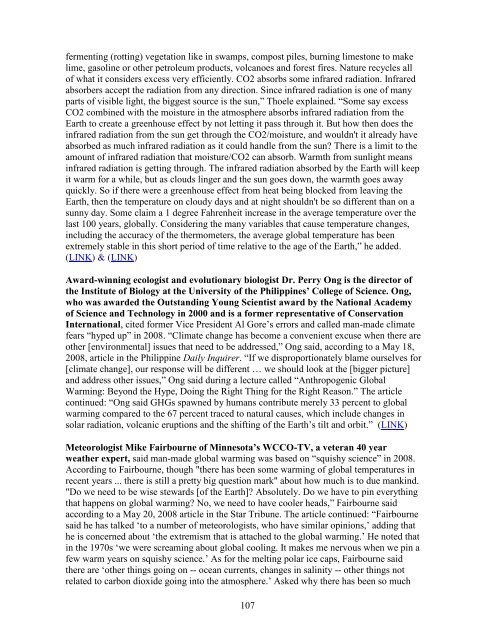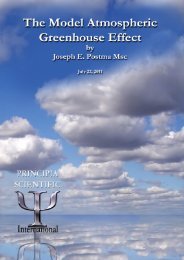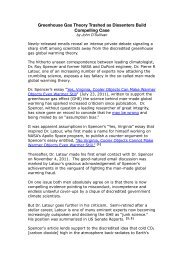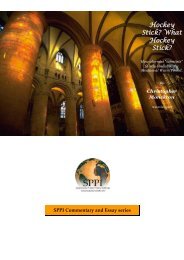Than 1000 International Scientists Dissent Over Man-Made Global ...
Than 1000 International Scientists Dissent Over Man-Made Global ...
Than 1000 International Scientists Dissent Over Man-Made Global ...
Create successful ePaper yourself
Turn your PDF publications into a flip-book with our unique Google optimized e-Paper software.
fermenting (rotting) vegetation like in swamps, compost piles, burning limestone to make<br />
lime, gasoline or other petroleum products, volcanoes and forest fires. Nature recycles all<br />
of what it considers excess very efficiently. CO2 absorbs some infrared radiation. Infrared<br />
absorbers accept the radiation from any direction. Since infrared radiation is one of many<br />
parts of visible light, the biggest source is the sun,‖ Thoele explained. ―Some say excess<br />
CO2 combined with the moisture in the atmosphere absorbs infrared radiation from the<br />
Earth to create a greenhouse effect by not letting it pass through it. But how then does the<br />
infrared radiation from the sun get through the CO2/moisture, and wouldn't it already have<br />
absorbed as much infrared radiation as it could handle from the sun? There is a limit to the<br />
amount of infrared radiation that moisture/CO2 can absorb. Warmth from sunlight means<br />
infrared radiation is getting through. The infrared radiation absorbed by the Earth will keep<br />
it warm for a while, but as clouds linger and the sun goes down, the warmth goes away<br />
quickly. So if there were a greenhouse effect from heat being blocked from leaving the<br />
Earth, then the temperature on cloudy days and at night shouldn't be so different than on a<br />
sunny day. Some claim a 1 degree Fahrenheit increase in the average temperature over the<br />
last 100 years, globally. Considering the many variables that cause temperature changes,<br />
including the accuracy of the thermometers, the average global temperature has been<br />
extremely stable in this short period of time relative to the age of the Earth,‖ he added.<br />
(LINK) & (LINK)<br />
Award-winning ecologist and evolutionary biologist Dr. Perry Ong is the director of<br />
the Institute of Biology at the University of the Philippines‟ College of Science. Ong,<br />
who was awarded the Outstanding Young Scientist award by the National Academy<br />
of Science and Technology in 2000 and is a former representative of Conservation<br />
<strong>International</strong>, cited former Vice President Al Gore‘s errors and called man-made climate<br />
fears ―hyped up‖ in 2008. ―Climate change has become a convenient excuse when there are<br />
other [environmental] issues that need to be addressed,‖ Ong said, according to a May 18,<br />
2008, article in the Philippine Daily Inquirer. ―If we disproportionately blame ourselves for<br />
[climate change], our response will be different … we should look at the [bigger picture]<br />
and address other issues,‖ Ong said during a lecture called ―Anthropogenic <strong>Global</strong><br />
Warming: Beyond the Hype, Doing the Right Thing for the Right Reason.‖ The article<br />
continued: ―Ong said GHGs spawned by humans contribute merely 33 percent to global<br />
warming compared to the 67 percent traced to natural causes, which include changes in<br />
solar radiation, volcanic eruptions and the shifting of the Earth‘s tilt and orbit.‖ (LINK)<br />
Meteorologist Mike Fairbourne of Minnesota‟s WCCO-TV, a veteran 40 year<br />
weather expert, said man-made global warming was based on ―squishy science‖ in 2008.<br />
According to Fairbourne, though "there has been some warming of global temperatures in<br />
recent years ... there is still a pretty big question mark" about how much is to due mankind.<br />
"Do we need to be wise stewards [of the Earth]? Absolutely. Do we have to pin everything<br />
that happens on global warming? No, we need to have cooler heads,‖ Fairbourne said<br />
according to a May 20, 2008 article in the Star Tribune. The article continued: ―Fairbourne<br />
said he has talked ‗to a number of meteorologists, who have similar opinions,‘ adding that<br />
he is concerned about ‗the extremism that is attached to the global warming.‘ He noted that<br />
in the 1970s ‗we were screaming about global cooling. It makes me nervous when we pin a<br />
few warm years on squishy science.‘ As for the melting polar ice caps, Fairbourne said<br />
there are ‗other things going on -- ocean currents, changes in salinity -- other things not<br />
related to carbon dioxide going into the atmosphere.‘ Asked why there has been so much<br />
107





